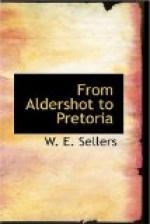By the courtesy of Dr. Theodore Marshall, we cull from St. Andrew the following particulars: ’Mr. Robertson is a native of Grantown, and, after finishing his university course at Edinburgh, was licensed by the Presbytery of Abernethy. He is a soldier’s son, and very early in his ministry determined to devote his life to soldiers. His first military appointment was the acting-chaplaincy at Dover. In 1885 he was transferred to Cairo, and accompanied the Cameron Highlanders on the march to Abri, thence on the return journey to Wady Halfa. All the way through, the men were loud in his praises. He spared himself no toil, cheerfully shared the men’s privations and dangers, and became to them almost more than a friend. The May Record tells how Robertson was specially reported by his Church for bringing in Lieutenant Cameron, who had been mortally wounded in the previous December; how, in the absence of a second doctor, he had volunteered to go out with a stretcher party under heavy fire, and look after the wounded; and, as Lieutenant Cameron had got hit while apart from the others, he had to be brought in at all risks. For his services he was mentioned in despatches, and received the medal and Khedival star.’[3]
Shortly after the close of the Egyptian War, Mr. Robertson received his commission. He served for some time as junior chaplain in London, and then was removed to Dublin. From Dublin he went to Edinburgh, and remained there until he was ordered to South Africa, as a member of General Wauchope’s staff and chaplain to the Highland Brigade. In South Africa he has greatly distinguished himself, and it goes for saying that ‘Padre’ Robertson, as he is affectionately called, is one of the most honoured and best-loved men in Her Majesty’s army.
We will, however, allow the head of the military work in the Presbyterian Church (the Rev. Dr. Marshall) to tell himself of Mr. Robertson’s work in South Africa. We quote from an article published by him in the Home and Foreign Mission Record:—
’Of the work of the Rev. J. Robertson in the field, it is unnecessary to write, as the newspaper correspondents have referred so often to his bravery and splendid services. One correspondent writes to me: “It is no exaggeration to say that the whole of Methuen’s army, and especially the Highland Brigade, deem his bravery worthy of the V.C. Everywhere, in train or camp, officers’ mess or soldiers’ tent, Padre Robertson is proclaimed a hero.” I was pleased to notice in the Record (the Church of England weekly), the other day, a letter from the Church of England chaplain who is with Lord Methuen. After describing the battle of Magersfontein, he refers to the Highland Brigade: “Being chiefly Highlanders, they were in Robertson’s charge. He, good-hearted fellow, was risking his life in the trenches and under fire to find General Wauchope’s body. Why he was not killed in his fearless efforts




